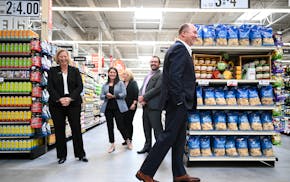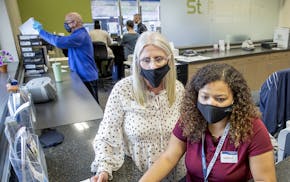Spencer Leuning says his parents, like many of his friends' parents, don't spend much time talking about money basics with him. When a friend of his was asked if she wanted to get 30 percent off her purchase at a Maurice's store by opening a credit card account, Spencer was surprised that she agreed, no questions asked. He estimates that 30 percent of his classmates have credit cards.
But Leuning, a senior at Lincoln HI High School in Ivanhoe, Minn., has picked up a few tips from LifeSmarts, a national program that develops fun, practical consumer and marketplace knowledge for teens. For one thing, he's waiting until he is in college to get a credit card.
"I'll get one when I need one, but I know better than to charge a $4 cup of coffee on it," he said.
Operated by the nonprofit National Consumers League, LifeSmarts is run in Minnesota by the Better Business Bureau. The program supplements existing curriculum in high schools and is used in classrooms or as a free extracurricular activity for grades nine through 12.
Such programs are more necessary these days than ever. According to a nationwide survey released Wednesday by the Federal Reserve, high school seniors, on average, answered correctly only 48.3 percent of questions about personal finance and economics.
In LifeSmarts, teams of four to five students practice online, as well as in school or as an extracurricular activity. Two or three teams compete in game-show-style matches at the state tournament, one of which was held in St. Paul in early March. A team from Lake Crystal Wellcome Memorial High School (LCWM) won the state tourney and will compete at nationals in Minneapolis today through Tuesday.
Unlike academic competition such as Knowledge Bowl, LifeSmarts relates to real life, said Spencer. He liked learning about business antitrust law, ethics and technology.
How financially prepared are today's teens?
Apart from LifeSmarts participants, experts disagree on whether teenagers today are financially illiterate or limping along at about the same competency as their parents did at their age.
Young people don't understand how their financial behavior affects their financial future, said Nathan Dungan of Share Save Spend financial education company. Few students know that credit scores can affect their ability to get a job; even fewer know what a credit score is. He advocates changing state policy to mandate financial literacy.
Richard Todd, a vice president at the Federal Reserve Bank in Minneapolis, said that despite what we hear about the financial illiteracy of today's students and young adults, it hasn't changed much over the years. Baby boomers once labeled irresponsible are on the whole saving adequately for retirement, Todd said. Consumers made mistakes in their early years, but they generally figure it out, he said.
Dungan and Todd agree on one thing: Today's marketplace is a lot more complicated than it was decades ago. Teenagers need more financial education to keep up.
LifeSmarts students apply what they learn
Lake Crystal coach Renee Rollings has been part of the LifeSmarts program for nearly a decade. Ten years ago, topics such as identity theft and credit cards weren't part of the curriculum. Now when kids leave her classroom, they know that it takes a long time to pay off a credit card balance by making minimum payments, that intangibles such as food and movie tickets shouldn't be charged, and that charging $7 in a debit account with a $5 balance can cost $40 in fees.
"It's real-world survival skills," Rollings said, "including checkbook banking, apartment leases, loans for cars and school, auto and health insurance."
Erica Roelofs, a senior at LCWM who will be competing at nationals this week, likes the practical hands-on learning about credit card applications (she has a debit card), overdrafts and annual percentage rates. The LifeSmarts technology module helped her make a more educated decision about how much computer memory she needed when she bought a laptop.
Her teammate Erik Jacobs said that LifeSmarts helped him figure out his taxes on income from his job at a local grocery store. When his parked car was hit by a snowplow in the school parking lot, he understood the difference between collision and liability insurance. Erik, a senior, says LifeSmarts is a great extracurricular activity. "It's like sports. I love to compete," he said.
Teenagers today have plenty of opportunities in school to show off their athletic competitive skills but fewer chances to show off academic skills, said Don Dickinson, a retired teacher from the Le Sueur-Henderson school district and longtime LifeSmarts coach. Dickinson likes how the competition develops teamwork, self-esteem and verbal confidence.
"Kids today have jobs and are expected to do their own financial planning. This gives them more skills to do it wisely," he said.
For more information about LifeSmarts, go to www.lifesmarts.org.
John Ewoldt • 612-673-7633 or jewoldt@startribune.com. His articles are online at www.startribune.com/dollars.

Hy-Vee reloads with wine tasting bar, cigar humidor and a DSW shoes area

As the Twin Cities supermarket battle heats up, who is No. 1?

How to earn up to 5% interest on a Minnesota checking account

In early evening, businesses in the Twin Cities scramble to close down

